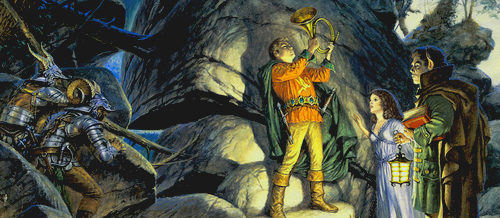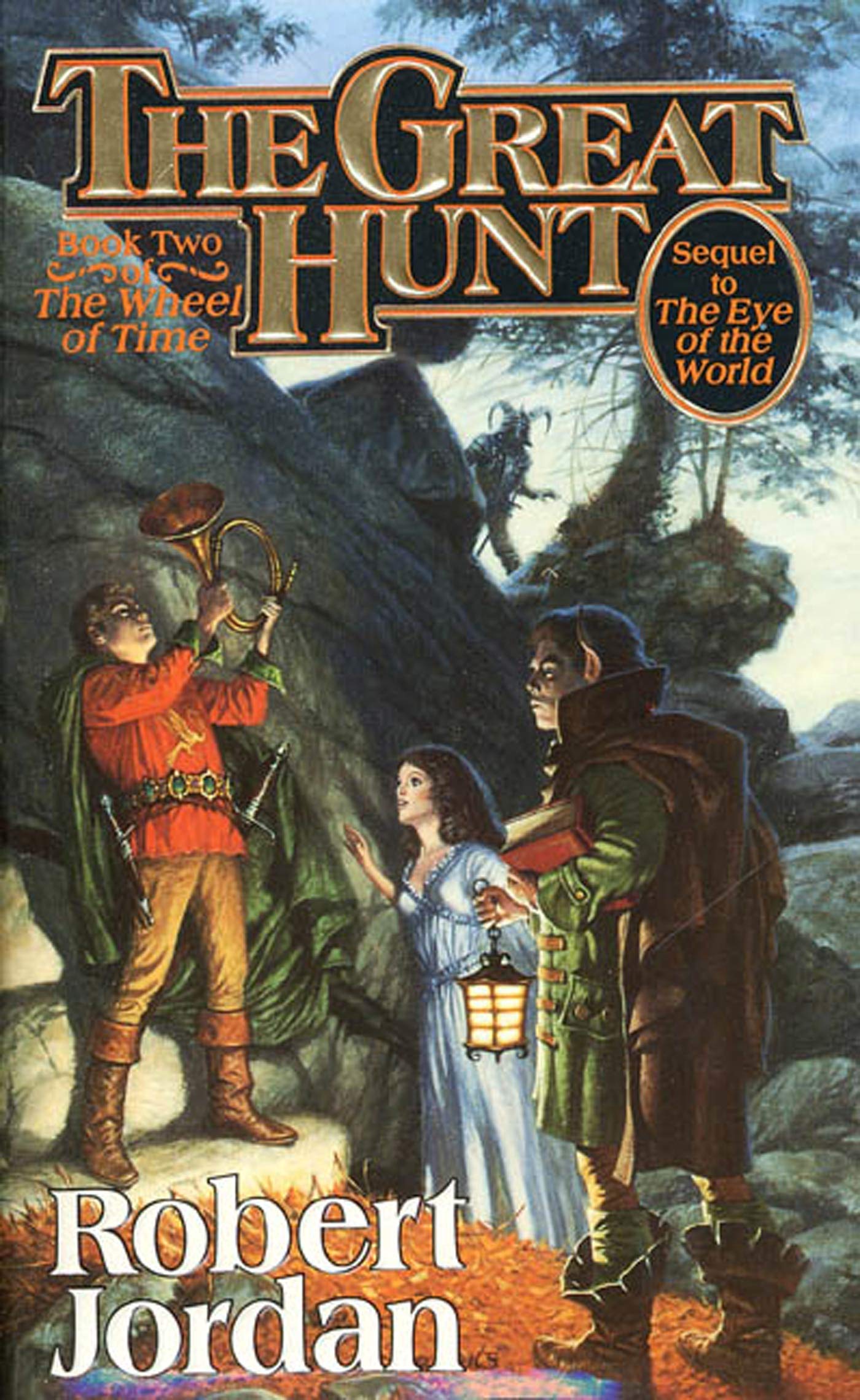

“A man who is forced is never completely his own master. He must dance on the strings of those who forced him.”
Whatever your feelings toward the first Wheel of Time book, they will likely be reproduced by the second volume in the series. The Great Hunt has many of the same faults of The Eye of the World—repetitive phrases, static characters, awkward interactions, info-dump conversations, etc. It picks up the story directly after the first book and moves at the same plodding pace and features a similarly haphazard plot as we are treated to what amounts to a chase scene (“the great hunt”) for the majority of the book. The ending partially rights the ship, but taken as a whole, The Great Hunt is a sprawling, uneven mess of fantasy-flavored pulp.
One of the most glaring issues with Jordan’s writing is that his characters remain static. After the experiences they went through in the first book, it is off putting to find Rand1 constantly wishing Perrin were by his side because Perrin knows how to talk to girls. That by itself is annoying, but then Perrin also wishes Rand were by his side because Rand knows how to talk to girls. That Rand routinely decides to keep information conveniently secret from both his companions and the reader is exasperating, as is his penchant for getting fooled both by transparent treachery and characters which are so shallowly written that even the most astute reader could not have predicted their betrayal. It’s unfortunate that one of the most intriguing characters, Selene, spends much of her time obviously playing with the main POV character, who can’t see through it because he’s mesmerized by her beauty (if only Perrin were with him). Rand refuses to help the Aes Sedai, choosing to believe stories he heard as a child instead of his experience with Moiraine Sedai, who has saved his life countless times.
Nynaeve—who tracked down the boys from Emond’s Field and took a harsh stance against the Aes Sedai for abducting them in the first book—is still harboring a personal grudge against Moiraine even though the latter’s intentions have been clearly explained to her. Jordan continuously piles up additional, more lethal threats against the good guys, but nothing can sway her to make amends. If I had to guess, her grudge is probably warranted based on what Jordan has planned for the rest of the series; he just forgot to write a sufficient reason for it into the first two books.
A great writer can make their reader feel clever, while a vain one tries to convince the reader that the writer is clever. I think Jordan has fooled a lot of people into thinking he is clever, but he really just keeps things from the reader and then relies on his deus ex machina predeterministic mantra, “the Wheel wills as the Wheel weaves.” This allows him room for sloppy writing because some godlike power barely touched upon is somehow controlling everything.2 There are many instances of characters “feeling” that they must do something or “knowing” something to be true. How can you not feel cheated when you read that for the umpteenth time?
“Fortune prick me,” “Light,” “I will not be a tool of the Aes Sedai,” “Tam is my father,” “I can never marry,” “Maybe I really am going mad.” Jordan utilizes the same phrases and thoughts over and over again, coupled with an overreliance on ellipses. On one hand, I get that this is supposed to feel “natural.” In our world, someone might say “gosh” or use the Lord’s name in vain instead of saying “Light.” Or they might let one thought trail off and start another, or stop mid-sentence to replace a word already spoken with a more suitable one.3 But when characters say “Light,” or “fortune prick me,” it just feels like conceited nonsense. And let’s not get into the stupid world-inflation tactic in the prologue, where Jordan uses the phrase “the man who called himself Bors” more than thirty times, and continues to do so even after we learn that man’s name is indeed Bors.
The real shame is that the world Jordan created is interesting but he simply can’t write it well. The central object of desire in The Great Hunt, the Horn of Valere, is a cool idea. When sounded, it physically recalls legendary warriors from the grave as they come to the aid of whoever blew the horn, whether they be good or evil. The concept of the damane (basically magic-wielding women enslaved by collars that bind them to their trainer) is neat as well, though it was not handled with very much care and I’m sure Jordan caught flak for being “misogynistic” for writing it. Interesting idea, but the actual text on the page leaves a bad taste in my mouth. His descriptions of sword fighting, in which he simply lists fictional tactics and fighting forms (e.g. “Hummingbird Kisses the Honeyrose. The Moon on the Water. The Swallow Rides the Air.”), allow the reader to use their imagination. They were a nice touch, and stand in stark contrast to his overly descriptive prose elsewhere. As well, the scene in which Rand experiences serial potential futures blurring by him in the blink of an eye was thrilling and unique. But these peaks are few and far between. To me, it seems like Jordan was a great “ideas guy,” in the same way that George Lucas was with the Star Wars franchise. Lucas was a decent enough director, but his strongest contribution was the worldbuilding and big picture ideas that helped form the wider scope of the series. He got bogged down in the details of the prequels in much the same way that Jordan fumbles his way through The Great Hunt. Good ideas, poor execution.
After two books, it feels like we should be roughly 300 pages into the first book in a trilogy, not half a million words deep into a fifteen books series. Both books had decently strong beginnings and endings. But the rest of the pages are predominantly fluff. The characters are languishing. There is little tension or mystique, and the plot has barely moved from the end of The Eye of the World. My stubbornness will keep me going, but so far the series is just above the threshold of being merely okay.
1. Who continually denies that he is the Dragon Reborn (i.e. the most important person in the universe, basically) despite it being obvious to everyone around him and the reader.
2. This could work. After all, some people believe that’s how our world works. It’s just relied upon to an absurd extent that undercuts character motivations and story arcs.
3. This also works in films. The Coen brothers are especially good at writing imperfect dialogue, showcased in films like Fargo and The Big Lebowski.
That’s accurate.